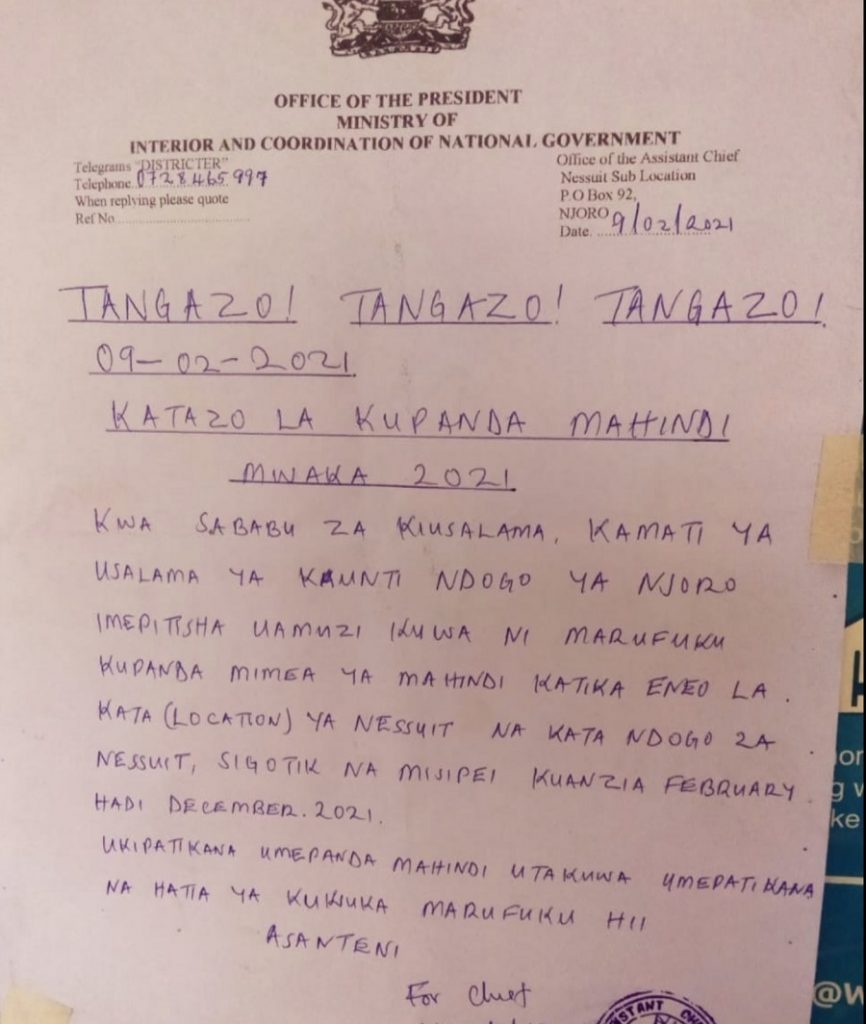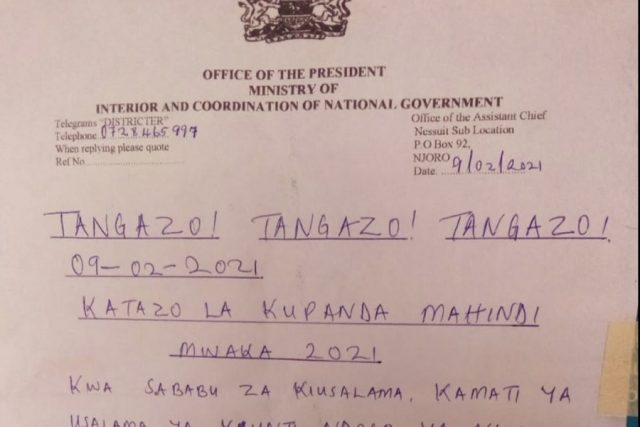
Image: Ban on maize cultivation
Now the Security Committee for Njoro Sub-County has passed a resolution banning the cultivation of maize in Nessuit, Sigotik and Misipei locations.
This ban stays in place from February to December 2021. Anyone who plants maize shall have violated this directive according to the memo.
It is not clear how growing of maize is a security issue in the above named locations in Njoro. The letter was too vague and lacked content in terms of how growing maize would cause insecurity in those three locations.
Kenyans on social media had mixed reactions to this declaration by the security committee in Njoro.
“No more planting of Maize at Nessuit location Njoro sub County in Nakuru throughout 2021! and no reason provided for. Maize is one of the main crops in the area with a farmer average harvest being 40 bag per acre. Farmers earn surplus to support their needs- fees to educate their children. Residents are asking what could be the reasons behind this move? Is there a county legislation to effect this move by zoning our area as a non maize zone? The fact that there is no alternative crop or livelihood or even guaranteed government subsidies is a big worry.” wrote John Samorai on Facebook.
“Nessuit & Mariashoni is amongst food basket depended areas in Nakuru county, thus prohibiting this product will lead to less surplus (hunger) in the area and dependants and affect many livelihood. One function of government is to protect life and properties of its citizens, of which they have done so by deploying police, Astu, & GSU camps in affected areas. My question is that, if at all they have deployed all these security personnel in ground for security purposes what role would maize planting affect in terms of security?...” Dennis Kibilo reacted to the announcement.
This reminds us of a period in Kenyan history when some crops like coffee were only grown by the white settlers.
Policy angle on this issue
Food security is one of the Big Four Agenda of the national government spear-headed by His Excellence President Uhuru Kenyatta. Banning of maize cultivation clearly going against these aspirations of the Office of the President.
According to Nakuru County Integrated Development Plan (CIDP), maize is one of the major crops grown in Nakuru. In 2018, Nakuru County produced 2.1 million 90 kg bags of maize and targets to produce 2.4 million bags by 2022. Ban on cultivation of maize in the three locations of Nessuit, Sigotik and Misipei will lead to failure to achieve the CIDP goal of producing 2.4 million bags of maize in 2022.
The county has in the past established plant clinics and employed plant doctors to conduct surveillance of diseases such as Maize Lethal Necrosis in Kuresoi, Molo, Njoro, Rongai, Nakuru North and Subukia.
How is cultivation of maize related to insecurity?
During last year’s conflicts in Nessuit, it was reported that criminals, arsonists hide in maize plantation and conduct attacks even during broad day light.
Banning of maize cultivation should not have been the action taken considering that the three locations have been secured. In 2020, the national government established a Police Station at Nessuit and two General Service Units at Ndoso and Nessuit.
Conclusion and Recommendations
- The Security Committee at Njoro should go to the drawing board and come up with a better solution focusing on the root cause of insecurity instead of treating the symptoms;
- The County Security organs should consult with the relevant organs at the county executive for instance in this case the Agriculture department to understand the consequences of any decision they want to make;
- There are some possible unexpected outcomes out of this decision to ban maize cultivation in Nessuit, Sigotik and Misipei. One of them is food insecurity among ethnic minorities such as the Ogiek who are the majority in Nessuit location and depend on maize as a stable food crop and a source of livelihood;
GOT a story? Contact Kerosi Dotcom on EMAIL info@kerosi.com


